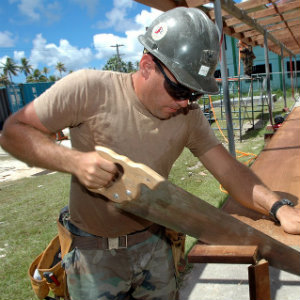Were you or a loved one injured while working as a carpenter? You may have several questions:
- What if my Workers' Comp claim is denied?
- Do independent contractors qualify for Workers' Comp?
- Are there other available forms of compensation?
- Do I need to talk with a lawyer?
Our experienced work injury lawyers can assist you with these and other concerns.

At Monheit Law, we have the knowledge to help injured carpenters earn the compensation they deserve.
Carpenters help to build and repair all types of building frameworks and structures, both in residential and commercial spaces. This type of work is physically demanding, and carpenters are routinely exposed to many hazards on the job. According to the US Bureau of Labor Statistics, "Carpenters have one of the highest rates of injuries and illnesses of all occupations."
In most cases, Pennsylvania workers who get hurt while working are eligible for financial assistance through Worker's Compensation. However, this only applies to workers who are employed by someone else. Those who are self-employed or have been classified as independent contractors do not qualify for these benefits.
In 2014, approximately 1 in 3 carpenters was self-employed. However, carpenters who aren't technically employed by someone else still have options for compensation after a work injury.
Types of Carpentry Work
Most construction workers are employed by the construction industry, in one form or another. But carpentry can be broken down into three main categories:
- Residential - These carpenters work on building, repairing, and upgrading residential homes - including floors, walls, cabinets, backyard projects like decks, and more. Most self-employed carpenters work in the residential field.
- Commercial - Commercial building projects like schools, shopping centers, and office buildings also require carpenters. This work may be a bit more complex and involve the use of steel, stone, and other materials.
- Industrial - Industrial carpenters work on large-scale construction projects, such as scaffolding and bridges.
FREE CONSULTATION
Compensation Options
If you've been injured while working on a carpenter project and it's impaired your ability to work, you may be concerned about how you will handle your injury  expenses. The possible routes for compensation depend on your classification as a worker.
expenses. The possible routes for compensation depend on your classification as a worker.
Employees
If you are an employed carpenter, you qualify for the same Workers' Comp benefits as any other employee in the state of Pennsylvania. So if you're injured on the job and it affects your ability to return to work, you're entitled to compensation for medical bills and a portion of lost wages.
Since this is a form of no-fault insurance, it doesn't matter who was responsible for your injury. In exchange for this guaranteed coverage, you waive the right to sue your employer, even if their negligence is to blame for your injury. Conversely, even if your injury was your own fault, you're still covered.
Possible Complications
However, just because workers are guaranteed coverage, doesn't mean they always get it. This is an insurance policy after all, which means there are insurance representatives involved who are paid to find reasons to limit or deny coverage. Additionally, your employer may dispute your claim in order to avoid seeing his or her premiums go up.
If your claim is denied, you'll be looking at a lengthy and stressful appeals process. Employers and insurance companies bank on workers giving up at this point.
This is why it's important to consider hiring an experienced work injury lawyer when you're hurt and out of work. We know how the system works and how to deal with insurance carriers and employers who are looking for ways to deny coverage.
Independent Contractors
Many of the carpenters working on construction sites are classified as independent contractors. But just because someone calls you an independent contractor, doesn't necessarily mean that you are one. Many employers use this label to avoid paying payroll taxes, unemployment, and workers' compensation - despite the fact that the job duties more closely resemble an employer/employee relationship.
If you have employee responsibilities, such as a strict work schedule and close oversight, a knowledgeable work injury lawyer could dispute your classification as an independent contractor.
If you are injured as an independent contractor on a construction site and another party was responsible, you may have the option to file a personal injury claim. Since these other workers aren't technically your coworkers, they aren't protected from lawsuits through Workers' Comp. For example, if you were struck by a tool which another worker dropped from above, you could seek compensation from that worker and his employer.
Self-Employed Carpenters
Many carpenters choose to be self-employed. These workers set their own schedules and choose their own projects. Many work on small home improvement jobs.
Self-employed workers may choose to purchase their own Workers' Comp insurance. In a high-risk field like carpentry, it's probably wise to have some form of protection for yourself. But uninsured carpenters still have options for compensation.
If you're working on a property and get injured because of hazardous conditions, you should consider a personal injury claim. For example, if you slip and fall on an icy sidewalk while working on an outdoor project, you could hold the property owner liable for not fixing the dangerous condition which caused your injury.
Common Carpentry Injuries
Carpenters regularly work with power tools and in awkward or physically straining positions. These working conditions make injuries fairly common. Injuries which frequently require compensation include:
- Muscle strains from lifting heavy objects
- Falls from ladders and scaffolding
- Cuts from sharp objects and tools, such as nailguns
- Eye injuries from flying sawdust
- Struck by falling tools, objects, and debris
Do I Need A Lawyer?
You're free to file a Workers' Comp claim on your own, but it is usually wise to enlist the guidance of a knowledgeable work injury lawyer.
If you're an employee, it's important to have someone who knows how to deal with employers, insurance carriers, and the Workers' Comp board. The right lawyer will know what it takes to get your claim accepted the first time, and how to get through the appeals process with minimal headaches.
Independent contractors and self-employed carpenter injury cases are especially complex. For these workers, it will be exceedingly difficult to secure compensation on your own. Legal counsel is often necessary in order to determine your eligibility for personal injury claims, or if you have been unfairly classified as an independent contractor.
No amount of research will provide you with definitive answers after a carpentry work injury. It's necessary to discuss the matter with a lawyer who has experience with these types of cases.
At Monheit Law, we offer free consultations for injured workers and only require payment if we successfully earn compensation for you. This way, you can fight for your right to compensation without needing to worry about how you will pay for legal representation.
Work Injury Resources
Monheit Law Montgomery County Office 215-866-2018
Directions to our Montgomery County Injury Law Office
4V4Q+FM Jenkintown, Pennsylvania
Open 24 hours
Carpenter injury attorney Jenkintown
Civil law attorney
Employment attorney
Law firm
Attorney
Social security attorney
Monheit Law South Philly Office 215-302-0095
Directions to our South Philly Injury Law Office
WRCH+CP Philadelphia, Pennsylvania
Open 24 hours
Carpenter injury attorney South Philly
Civil law attorney
Employment attorney
Law firm
Attorney
Social security attorney
